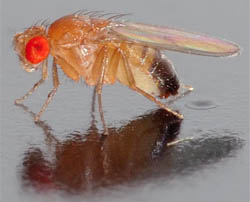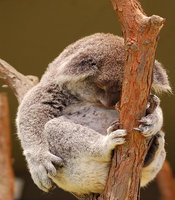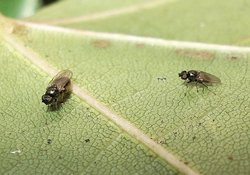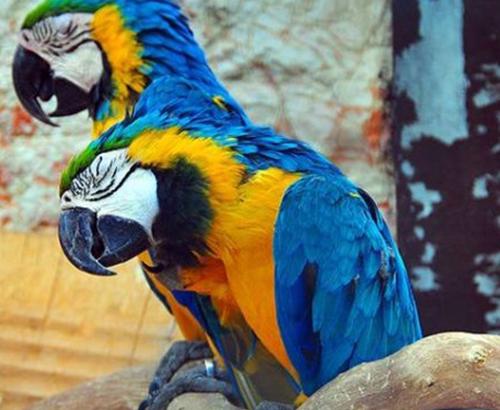
Eat More, Sleep More
show/hide words to know
What's in the Story?

Scientists are using flies to learn how eating habits might affect our need for sleep.
You've tried counting sheep. You've even recited all of the president's names. After all that, for some reason you still just can't fall asleep. Then you hear it again – a rumble in your stomach. Have you ever noticed that when you’re really hungry, you can’t fall asleep? The rumbling in your stomach seems to keep you awake all night. The next day your brain may seem a little slow until you take a nap and you feel like yourself again. Well, the same thing happens to flies. Whenever they’re really hungry – starving – they don’t get any sleep. But afterwards, some of them don’t feel sleepy and slow like you might. Instead it's as if they slept all night and they are ready to start the day.
In the PLOS Biology article, "The Perilipin Homologue, Lipid Droplet 2, Regulates Sleep Homeostasis and Prevents Learning Impairments Following Sleep Loss(link is external)," scientists looked at the relationship between eating and sleeping in flies. They found that in some flies, the more they eat, the more they sleep.
Sleep: It’s Important

Sleep allows the body to rest and repair itself.
Most of us have fought with our parents to try to push bedtime back by even just five more minutes. But maybe we shouldn't fight so hard to stay awake longer. For most animals, including humans, sleep is very important. It allows the body and mind to rest after being active the whole day.
While you are awake, even if you are resting, your mind and body are hard at work. They make sure you’re breathing, eating, walking, and learning. This is a big job. If you don’t let your body and mind rest, they won’t work as well the next day. You may be tired and slow, making it hard for you to learn.
Some flies that don’t get enough sleep also have trouble learning, but whether or not a fly’s lack of sleep affects its learning may be due to how much fat is in the fly’s body. Scientists found that skinny flies often don’t have trouble learning, even if they don’t get enough sleep.
Skinny Flies + Fat Flies = Results for Humans?

The fly on the right is like a brummer fly – it’s kind of fat. But the fly on the left is a lot skinnier, so it's more like a lipid storage droplet 2 fly.
Flies are a model organism for humans. This means that scientists can study what happens in flies and then take their findings and try to apply them to humans. These scientists looked at two types of flies, fat flies and skinny flies. The difference between these two fly types is their genes. The fat flies have a gene called brummer that tells their bodies to store all the lipids, or fat, that they eat. These flies can live off their fat stores if they can’t find food. The skinny flies have a gene, lipid storage droplet 2, that stops them from storing fat so they stay skinny.
Hey Guys, I’m Tired

Each side of this teeter-totter (or seesaw) can move up and down. To keep flies awake, scientists placed them on a miniature version of a teeter-totter and moved it every 10 seconds.
To figure out what sleeplessness does to the flies, the scientists kept all the flies awake. This is easier than you might think. First, you put all the flies on a teeter-totter, a long board that tilts back and forth. The flies get all balanced and cozy on one side of the board, almost comfy enough to fall asleep...but then the board gets tilted. The flies then have to rebalance, keeping them awake. The teeter-totter was tilted every 10 seconds during testing, so the flies were kept awake by constantly having to move to rebalance themselves.
The next day, scientists tested the flies to see how tired they were and whether they could learn. To see if the flies were tired, they tested their blood for amylase. Amylase is a hormone that is usually in the blood of sleepy animals.
To see if the flies had trouble learning, they tried to teach the flies to avoid light, even though flies are naturally attracted to it. To teach the flies to do this, scientists took lighted tubes and covered them with a bad-tasting chemical. When the flies went toward the lighted tubes, they would taste the chemical and want to get away from it. The skinny flies were able to learn to avoid light, but the fat flies did not learn to avoid it.
Sleepy, Sleepy, Not Sleepy
The fat flies had trouble learning, but they also has a lot of amylase in their blood. When organisms are tired, they produce the hormone amylase. The high levels of amylase in fat flies meant that they were very tired.
The skinny flies were different. They had very little amylase in their bodies, showing that they were not tired. The scientists were also able to teach the skinny flies to avoid light, showing that they were able to learn.
Breaking News: Fats Change Sleep Patterns
Remember, the fat flies and skinny flies have two different genes controlling lipid storage. The fat flies have a gene that tells their bodies to store lipids. But the skinny flies have a different gene that tells their bodies not to store lipids. The scientists think that the lipids stored by the fat flies changed how they responded to the same environment as the skinny flies. The fat flies needed more sleep because the lipids changed the way cells reacted and controlled sleep processes. The next step is to discover exactly how the lipids change these processes.
Lipids and Learning, and Sleep! Oh my!
By looking at flies, scientists learned that sleeping and learning are related to lipid storage. The fat flies, which have lots of lipids, didn’t sleep. They were tired and couldn’t learn. The skinny flies, which don’t have very many lipids, didn’t sleep either. They weren’t tired, and they could still learn.
So what does this mean for you when you are lying in bed, staring at the ceiling with a grumbling stomach? Scientists already know that people who are hungry have trouble falling asleep. But humans don't have the same genes as skinny flies, so they're not protected from sleep loss. This means that when people don't get enough sleep, they are tired and they do have trouble learning, just like the fat flies. So the next time you try to stay up past your bedtime, remember that getting enough rest will make learning easier for you.
Additional images from Wikimedia Commons.
Drosophila Melanogaster fly by André Karwath via Wikimedia.
View Citation

Be Part of
Ask A Biologist
By volunteering, or simply sending us feedback on the site. Scientists, teachers, writers, illustrators, and translators are all important to the program. If you are interested in helping with the website we have a Volunteers page to get the process started.







